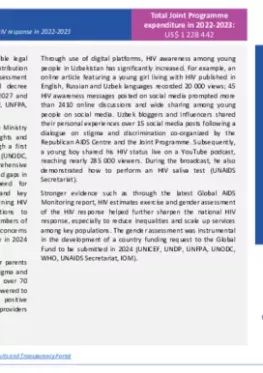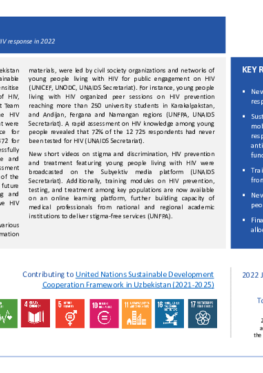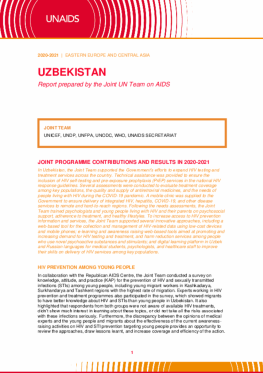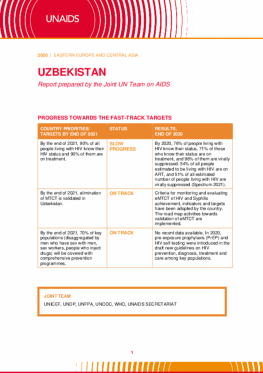|
Uzbekistan
Uzbekistan continued to work on creating a favourable legal environment for the HIV response with significant contribution from the Joint Programme. Robust advocacy, a legal assessment and technical support led to a new presidential decree strengthening the HIV response between 2023 and 2027 and aiming to achieve the 95-95-95 targets (UNICEF, UNDP, UNFPA, UNODC, WHO, UNAIDS Secretariat, IOM).
More than 60 law enforcement representatives from the Ministry of Interior gained better understanding of human rights and gender to support efforts in the HIV response through a first national workshop organized by the Joint Programme (UNODC, UNAIDS Secretariat). In addition, the 2023 comprehensive assessment of the national HIV legal framework identified gaps in the regulatory framework and underlined the need for eliminating punitive laws that limit vulnerable and key populations from accessing HIV services and strengthening HIV prevention programme. Results and recommendations to improve the legal framework were presented to 40 members of Parliament and discussions on addressing human rights concerns and integrating gender-sensitive approaches will follow in 2024 (UNAIDS Secretariat, IOM).
Adolescents and young people living with HIV and their parents benefitted from tailored HIV prevention, treatment, stigma and discrimination information and trainings. For instance, over 70 adolescents living with HIV and their parents were empowered to improve their treatment adherence; and foster positive relationships with their peers, families and healthcare providers (UNICEF, UNAIDS Secretariat).
Through use of digital platforms, HIV awareness among young people in Uzbekistan has significantly increased. For example, an online article featuring a young girl living with HIV published in English, Russian and Uzbek languages recorded 20 000 views; 45 HIV awareness messages posted on social media prompted more than 2410 online discussions and wide sharing among young people on social media. Uzbek bloggers and influencers shared their personal experiences over 15 social media posts following a dialogue on stigma and discrimination co-organized by the Republican AIDS Centre and the Joint Programme. Subsequently, a young boy shared his HIV status live on a YouTube podcast, reaching nearly 285 000 viewers. During the broadcast, he also demonstrated how to perform an HIV saliva test (UNAIDS Secretariat).
Stronger evidence such as through the latest Global AIDS Monitoring report, HIV estimates exercise and gender assessment of the HIV response helped further sharpen the national HIV response, especially to reduce inequalities and scale up services among key populations. The gender assessment was instrumental in the development of a country funding request to the Global Fund to be submitted in 2024 (UNICEF, UNDP, UNFPA, UNODC, WHO, UNAIDS Secretariat, IOM).





